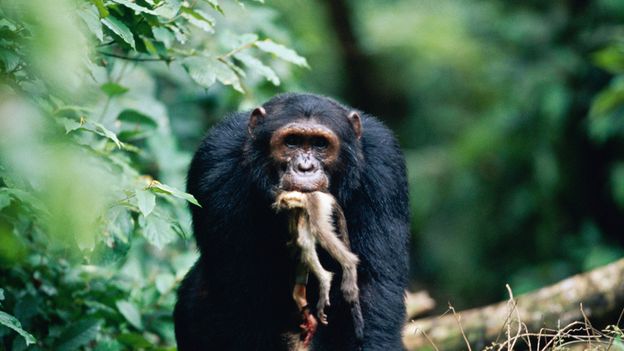
ellioti) live in a small range around the border of Nigeria and Cameroon eastern chimpanzees (Pan t. The chimpanzee species (Pan troglodytes) is split into four subspecies, according to the Integrated Taxonomic Information System (ITIS): Nigeria-Cameroon chimpanzees (Pan t. They can survive longer in captivity, where one female lived into her 70s. Chimpanzees typically live up to about 50 years in the wild, according to the IUCN.

As they grow up, infants begin to walk on their own but continue to hitch a ride on their mothers, increasingly on her back, until they are weaned at about 4 to 5 years old. (2 kg) at birth and is carried around clinging to its mother's abdomen, according to ADW.

Females give birth to a single baby chimpanzee or occasionally twins. Much variation has been observed in all aspects of chimpanzee social structure and reproductive strategies, according to the Max Planck Institute for Evolutionary Anthropology.Ī chimpanzee gestation period lasts about 230 days or almost 33 weeks, according to the International Union for Conservation of Nature (IUCN). Males may sometimes secure exclusive access to females for reproduction by preventing other males from mating with the female, although females also have some mate choice. Mating occurs more frequently than required for breeding purposes and serves social functions as well, such as developing bonds between individuals, according to ADW. Male and female chimpanzees mate with multiple partners throughout the year. Related: Chimps are naturally violent, study suggests This warlike behavior, documented by famed primatologist Jane Goodall, among others, challenged the notion that warfare is a development of modern humans. Chimpanzees are the only species other than humans to carry out coordinated attacks on each other, Live Science previously reported.

Male chimpanzees defend their community's territory against neighboring chimp communities and will kill members of other groups. Males will stay in their birth community, while females can move into neighboring communities once they are old enough to breed. They live in fusion-fission societies where the community breaks up into small subgroups (fission) that travel separately and sometimes come together (fusion). Chimpanzee societyĬhimpanzees are highly social animals and live in communities of between 10 and 180 individuals, according to the Max Planck Institute for Evolutionary Anthropology in Germany. The Jane Goodall Institute UK noted that pet chimpanzees are destructive and too dangerous to be kept as part of the family, and that it is difficult to keep them stimulated and satisfied in a human environment. During attacks, chimps will target a person's face, hands, feet and genitals. Most of the time these are isolated and seemingly reckless attacks by individual chimps, but one chimpanzee in the 1990s killed seven children before he was killed by humans, National Geographic reported.Ĭaptive or pet chimpanzees attack people far more often than their wild kin, because they can lose their fear of people altogether. Chimps have also snatched and killed human babies. Chimpanzees typically direct their aggressive and sometimes predatory behavior toward children because the animals are more fearful of larger human adults, especially men, according to National Geographic. Chimpanzees may then take to stealing unprotected human food, such as crops, and in the process become more confident around humans.Ĭhimpanzees have attacked more than 20 people in the Western Region of Uganda over the past 20 years and killed at least three human infants since 2014, National Geographic reported in 2019. This usually happens when humans move into and destroy chimpanzee habitats, reducing their access to food. However, there have been recorded incidents of chimpanzees attacking and killing people. Wild chimpanzees are usually fearful of humans and will keep their distance.

(Image credit: Anup Shah via Getty Images)


 0 kommentar(er)
0 kommentar(er)
